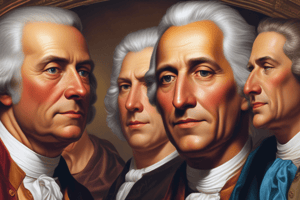Podcast
Questions and Answers
What were the primary goals of classical education mentioned in the text?
What were the primary goals of classical education mentioned in the text?
- To cultivate wisdom, virtue, and eloquence (correct)
- To promote the study of mathematics and engineering
- To master modern languages and scientific knowledge
- To focus solely on physical education and sports
How did James Madison's classical education influence his political thought?
How did James Madison's classical education influence his political thought?
- By relying on Aristotle and Cicero to develop his political thought (correct)
- By studying French literature extensively
- By avoiding debates and focusing on personal reflection
- By ignoring classical philosophy in favor of contemporary ideas
Why did Alexander Hamilton believe that a well-educated citizenry was essential?
Why did Alexander Hamilton believe that a well-educated citizenry was essential?
- To maintain a stable and prosperous society (correct)
- To increase the country's military power
- To limit individual freedom and creativity
- To encourage ignorance and superstition
What did the Founding Fathers' commitment to education reflect about their values?
What did the Founding Fathers' commitment to education reflect about their values?
How did the Enlightenment philosophy influence the development of American democracy?
How did the Enlightenment philosophy influence the development of American democracy?
What is the approximate equivalent of 1 pica in millimeters?
What is the approximate equivalent of 1 pica in millimeters?
How many twips are in 1 point?
How many twips are in 1 point?
When designing text in electronic mediums, which unit of measurement is typically used for digital displays?
When designing text in electronic mediums, which unit of measurement is typically used for digital displays?
Which unit of measurement provides the finest control over text and object placement in desktop publishing and graphic design software?
Which unit of measurement provides the finest control over text and object placement in desktop publishing and graphic design software?
What is the primary purpose of using a combination of different units of measurement, such as picas, points, millimeters, and twips, when designing text-based projects?
What is the primary purpose of using a combination of different units of measurement, such as picas, points, millimeters, and twips, when designing text-based projects?
Flashcards are hidden until you start studying
Study Notes
The Founding Fathers' Education: Enlightenment Philosophy and Classical Education
As America's Founding Fathers shaped the nation's constitutional framework, their intellectual foundations were deeply rooted in the Enlightenment philosophy and classical education traditions. This background profoundly influenced their perspectives on liberty, justice, and the structure of government.
The Enlightenment's Impact
The Enlightenment, a European intellectual movement from the late 17th to the mid-18th century, emphasized rationality, empiricism, and human progress. Influential thinkers like John Locke, Montesquieu, Voltaire, and Rousseau advocated for natural rights, individual liberty, and the separation of powers. The Founding Fathers, well-versed in these ideas, sought to establish a society based on these principles.
Inspired by Enlightenment philosophers, the Founding Fathers believed in the inherent rights of individuals, the necessity of a limited government, and the importance of education in fostering a virtuous citizenry. The establishment of the United States was a direct response to the principles of the Enlightenment, and the Founders' education played a significant role in shaping their thought and actions.
Classical Education
The Founding Fathers' classical education encompassed various liberal arts disciplines, including grammar, rhetoric, logic, geography, history, and philosophy. The primary goal was to cultivate wisdom, virtue, and eloquence, enabling individuals to think critically and participate in civic life.
Classical education emphasized the study of ancient languages, such as Latin and Greek, which allowed students to access primary sources in their original language. This approach fostered a profound understanding of history, culture, and the human condition.
For example, James Madison, the "Father of the Constitution," studied Greek and Latin extensively and was known for his eloquence in debate. He also relied on classical philosophy, particularly Aristotle and Cicero, to develop his political thought. Madison's understanding of classical republicanism, a political philosophy that emphasized the importance of virtue and civic engagement, deeply influenced his role in shaping the U.S. Constitution.
Similarly, Alexander Hamilton, the first U.S. Treasury Secretary, was a staunch advocate for the value of education. He believed that a well-educated citizenry was essential for maintaining a stable and prosperous society. Hamilton's classical education, including his studies in Latin, Greek, and philosophy, provided him with the intellectual foundation he needed to contribute to the development of the U.S. Constitution and the country's economic policies.
The Legacy of Enlightenment Philosophy and Classical Education
The Founding Fathers' education, rooted in Enlightenment philosophy and classical education, fundamentally shaped the values and ideals of the American government. Their commitment to natural rights, individual liberty, and the importance of education in fostering a virtuous citizenry continues to resonate today.
The Founders' dedication to the principle of informed citizenship and their belief in the power of education to transform society have been instrumental in the United States' development as a democracy. Their intellectual legacy continues to influence debates over the role of government, the importance of individual rights, and the necessity of education in cultivating a just and equitable society.
The legacy of the Founding Fathers' education, enriched by the Enlightenment philosophy and classical education traditions, provides valuable insights into the foundations of American democracy and the enduring importance of education in fostering a vibrant and engaged citizenry. As we continue to grapple with the challenges of our modern world, understanding the intellectual foundations of our nation's founders and their commitment to education remains a crucial endeavor.
Studying That Suits You
Use AI to generate personalized quizzes and flashcards to suit your learning preferences.




